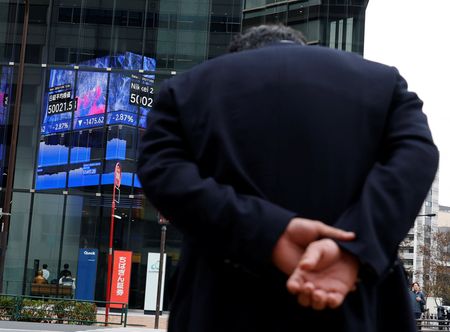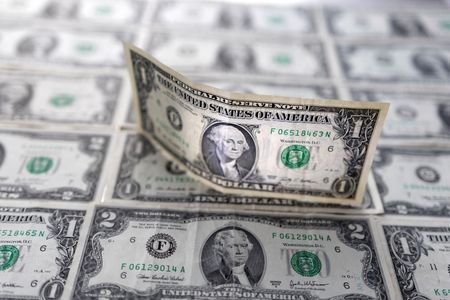By Enes Tunagur
LONDON (Reuters) -Oil prices edged higher on Wednesday as investors digested U.S. inventory data pointing to firmer fuel demand, while weaker economic data from top oil importers weighed on prices.
Brent crude futures rose by 45 cents, or 0.7%, to $64.89 a barrel by 1041 GMT, having touched a near two-week low in the prior session. U.S. West Texas Intermediate crude was up 46 cents, or 0.76%, at $61.02.
Oil probably found support from U.S. data that was not as bad as feared thanks to large product inventory declines, suggesting demand was holding up, UBS analyst Giovanni Staunovo said.
U.S. crude stocks rose by 6.52 million barrels while gasoline and distillate inventories fell by 5.65 million and 2.46 million barrels, respectively, in the week ended October 31, sources said, citing Tuesday’s American Petroleum Institute figures.
Weaker economic data coupled with a rally in the U.S. dollar kept oil from making significant gains, while prices found support from refined products amid lower U.S. stocks, PVM analyst Tamas Varga said.
China’s factory activity shrank for a seventh month in October, while U.S. manufacturing contracted for an eighth straight month in October.
The U.S. dollar index, which measures the currency against the euro, sterling and other peers, was at a three-month high, buoyed by division among the Federal Reserve board, indicating low odds for an interest rate cut in December.
A stronger greenback makes dollar-denominated oil more expensive for holders of other currencies, which can affect demand. A U.S. interest rate cut typically boosts demand.
On the supply side, Russia’s Black Sea port of Tuapse has suspended fuel exports, while its oil refinery halted crude processing after Sunday’s Ukrainian drone attacks on its infrastructure, according to two industry sources and LSEG ship tracking data.
The Organization of Petroleum Exporting Countries and allied producers, known as OPEC+, agreed on Sunday to increase output by 137,000 barrels a day in December. The group decided to pause further increases in the first quarter of 2026.
(Reporting by Colleen Howe in Beijing and Siyi Liu in Singapore; Editing by Christopher Cushing and Clarence Fernandez)











